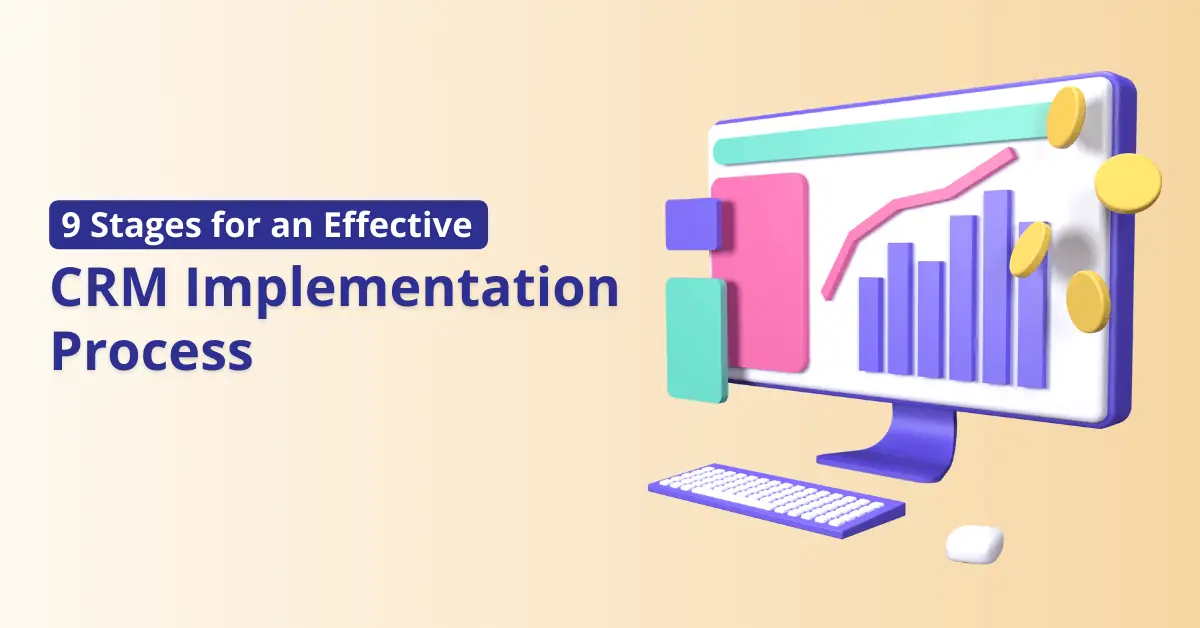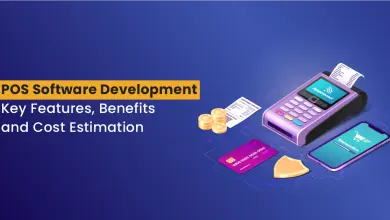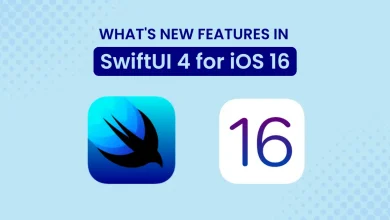9 Stages for an Effective CRM Implementation Process

Introduction of CRM
To increase customer acquisition and retention, companies seek to optimize their customer relationships. At the heart of this process, CRM software appears as a tool serving the company’s marketing and commercial objectives. More than a database, CRM acts as a facilitator and accelerator of sales processes. You still have to choose a flexible CRM solution in line with your needs and take care of its implementation.
In this article, we present the 9 essential steps for a successful CRM implementation process.
Align the CRM implementation strategy with the business objectives of the company
1. Analyze the Existing
Before thinking about the tool, the success of a CRM implementation process goes through the first phase of strategic reflection.
First of all, it is necessary to carry out an inventory in order to identify the main problems encountered by the marketing and sales teams with the existing processes and tools.
Who are the company’s target customers? What are their preferred communication channels? How does their purchasing journey unfold? What prospecting methods do the teams use?
Starting from the targets and existing processes, we can then detect the difficulties or blockages that impact sales performance and which the CRM software will have to remedy.

2. Define the Objectives and Scope of the Project
The CRM implementation process must remove the brakes that prevent the company from achieving its business objectives.
It is, therefore, necessary both to review the processes to overcome blockages and to find the tool that corresponds to the new orientations.
For example, if the company switches from a traditional prospecting approach to an inbound method, it will set new objectives. This strategic change will also influence the choice of tool.
To define the scope of the project, and in particular its functional scope, it must, therefore, be aligned with the chosen commercial strategy. Flexible CRM solutions are thus, the need of the day.
3. Develop use Cases with End-Users
Aligning the CRM implementation strategy and the company’s strategy is essential. What is equally important is to involve end-users in the project very early on.
One of the main causes of failure of the CRM implementation process lies in the low adoption of the tool by the teams concerned.
If the teams are not involved, they risk not using the CRM software, using only a small part of its functionality or misusing the tool.
To avoid this pitfall, it is advisable to work with the marketing, sales, and after-sales teams on use cases. The project manager can then collect their operational needs and, at the same time, begin to advise on the approach to be implemented and the possible flexible CRM solutions.
4. Define Specifications
Before contacting CRM solution providers, it is best to record all information relating to the project in a specification. The drafting of the specifications will be done in 6 stages.
The document will include:
- The context of the project
- Goals
- The functional scope
- Use cases
- The estimated budget
- A provisional project schedule
It will serve as a guide to choosing flexible CRM solutions that are truly suited to the needs of the business. It will also offer insights on CRM implementation costs.
5. Choose a Solution
On the basis of the specifications, the CRM project manager will compare the existing solutions on the market. The first step is to benchmark the CRM software tools and build a list of service providers meeting the identified needs.
Then, a more in-depth consultation will take place regarding CRM strategy planning with the few suppliers selected. To choose the lucky winner, it is recommended to list the essential selection criteria and to assign a score to each provider for each item.
6. Configure the New Tool
You have identified specific needs in relation to your processes and your use cases. Therefore, you are not necessarily going to use your CRM software in a standard version.
Upstream, it is necessary to define the data sources to be integrated into the software. Then, to align it with your CRM strategy planning processes, you must configure the tool.
This Important Step Consists of:
- Customize the fields that the employees concerned will need
- Set up the desired automation
- Configure the integrations between the CRM and the other IT tools used (marketing automation, emailing, ERP, etc.)
7. Set up a group of Beta Testers
Before deploying the project to your teams, you will define an implementation schedule. In order for the project to perfectly meet the operational needs of employees, you will benefit from setting up a test team.
Their feedback at the different phases of the CRM implementation process will allow you to build a suitable tool.
During this time, you must, of course, inform all your teams about the progress of the CRM project. Deploy a flexible CRM solution and evangelize internally.
8. Launch the Project
Once the testing software phase is conclusive and the tool is validated by the group of beta testers, it is time to generalize the solution to the teams concerned.
It is desirable to put in place good practice guides and user advice available to teams. At the same time, you can appoint a referent in each department, ideally a member of the test team.
The latter will be able to reassure, give answers, and act as an intermediary between the field teams and the project manager.
But above all, the emphasis must be on training on the CRM software. You must give all the keys to the teams to take the solution in hand and make optimal use of it.
9. Set up a Continuous Improvement Process
A few weeks after the CRM sales team deployment of the solution, it is wise to plan a progress report. For this, the project manager can use the CRM dashboards and make an initial assessment of the main KPIs.
This report should also be used to analyze feedback from operational teams on the use of the solution. This will be an opportunity to take into account feedback on the functions to be improved or on avenues for optimizing the CRM software.
Then, as part of the management of the CRM implementation strategy, you can organize regular points to adjust the tool to user needs and improve performance.
Succeed in your CRM Software Development Project with OneClick
For your Customer Relationship Management (CRM) project, we support you in the implementation of flexible CRM solutions.
The platform has several modules (sales, marketing, service) and also integrates a workflow creation tool allowing you to model and automate your processes. It, therefore, adapts to different business needs and covers the entire customer life cycle.
Thanks to its ready-to-use process models, CRM software implementation time is reduced. Complementary modules and specific solutions can be added to meet industry or specific needs.
Finally, its low-code platform makes it easy and quick to implement changes. Deadlines and costs are decisive factors for the success of a CRM implementation process. OneClick makes it possible to meet these imperative requirements for customers.
From an operational standpoint, CRM software enjoys a high adoption rate due to its ease of use. It can be used from any medium (tablet, mobile, PC).

OneClick also Offers Several Functional Advantages:
- Modeling and automation of marketing, sales or after-sales service processes
- 360° view of customers and follow-up of leads and opportunities
- Segmentation of the contact base
- Customizable dynamic dashboards
The success of a CRM implementation process requires preparation in terms of strategy and participation of the internal resources involved. To achieve its objectives, CRM implementation must be based on a clear and contextualized strategy and on employees’ support for new processes and the chosen tool.
In addition to the choice of the solution itself, the definition of needs upstream and the involvement of employees in the project are the key success factors of your project.
Efficiently manage your employees with our powerful employee management app. Streamline schedules, track attendance, and simplify HR tasks. Try it now!
OneClick IT Solutions has the expertise and know-how to support you in the implementation of the solution. Discover the CRM offer here.





